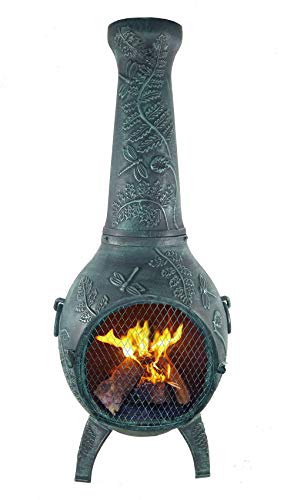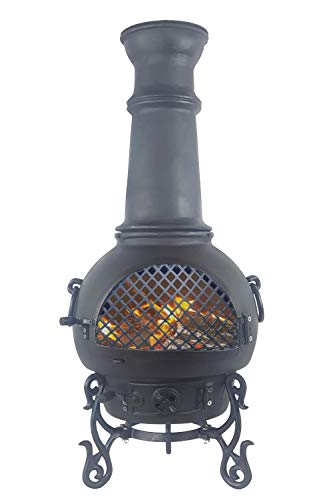9 Lessons Your Parents Taught You About Fire Pits Chimineas
페이지 정보
작성자 Xavier Ketner 댓글 0건 조회 31회 작성일 24-09-20 15:13본문
 Fire Pits Vs Chimineas
Fire Pits Vs ChimineasChimineas are constructed with a closed structure to keep sparks and embers in check effectively directing smoke upwards. This makes them safer to use near children and on surfaces that are flammable.
Personal preferences in aesthetics can also be a factor, with both clay and metallic models that can be adapted to a wide range of home and garden styles.
Material
The material used to create the chiminea can have an impact on its design and performance. Models made from clay and terracotta come in many styles to complement both modern and traditional landscapes. Metal chimineas are more utilitarian and are designed to withstand high temperatures, so they can be used as cooking equipment.
Both types of chimineas need some care to keep them looking and function their best. They need to be cleaned regularly to avoid excessive ash accumulation, and protected from freezing and rain temperatures. They should be kept in an area free of flammable materials, and easily moved. This is crucial if nearby plants could be affected by burning or heat.
Chiminesas shouldn't be put outside, like a firepit. It should be set on a flat, smooth surface that is designed for outdoor use, like pavers or cement. It should be placed at least 10 feet from your home in order to prevent fire and smoke damage. Chimineas should be located so that the predominant winds move the smoke away from the house and toward the chimney stack. This can also aid in sooting and reduce unpleasant odors.
It's important to note that a chiminea can produce more smoke than a fire pit, so it may not be ideal for parties or large gatherings where there are lots of people living in the immediate area. A chiminea is better at controlling smoke than a firepit because it's more confined, and the chimney stack directs the smoke upwards instead of directing it outwards.
If you're looking for a chiminea which has a modern chiminea appearance, consider this wood-burning model from Wiosi. It features a triangular opening that allows you to fit larger logs, and also provides 360-degree heat coverage. It also has a rain cap, a poker, and a grate for burning smaller pieces of wood.
Style
Both fire pits and chimineas can improve your outdoor living spaces by providing an inviting space to gather with friends and family on chilly evenings. They differ in terms of style, design and function. When deciding on the kind of product you'll need to take into consideration the space available, your preferences for aesthetics and safety issues. Consider your lifestyle and energy efficiency when choosing the best option.
A fire pit is an open bowl like a base on which you can stack logs and a chimney on top to carry smoke upwards. For the best results, it is recommended to use well-seasoned wood that has been kiln dried. You should also keep logs on hand so that you do not run out of wood before your guests depart. Chimineas are more traditional design and is intended to be used for cooking as well as heating.
The word chiminea comes from the Spanish word for chimney. They are built with broad bases that taper into a narrow chimney, and they are usually decorated with intricate details for added beauty. They are a great option for smaller outdoor areas, because they don't require too much space.
You can choose from a range of materials such as steel and cast iron for durability and clay or terracotta for giving them a more traditional appearance. A clay or terracotta fireplace can crack at high temperatures. But, it's the most affordable alternative. It also has a charming vintage look which can increase your home's value. Cast iron is heavier and more durable than other metal chimineas however it is more expensive.
Some chimineas have a metal finish that has natural patina of rust. This is a result that happens when metal is exposed to air and water. This finish is durable, and can last a long time. Regularly cleaning your chiminea with soapy water and a brush is essential for maintaining it. Moreover, you must protect it from direct contact with water in the aftermath of heat to prevent rust and corrosion. Be sure to move your chiminea with care and not place it on surfaces that could be damaged by the intense heat.
Ventilation
A chiminea's design incorporates a chimney for directing smoke and soot away from the people who are gathered around the fire. It is a great option for small areas. It also permits an optimal air circulation that is ideal for outdoor cooking. This reduces the risk of fire damage on your furniture and patio.
Chimineas are made out of terracotta or clay or from a variety of metals like steel and cast iron. The latter is less durable and may crack when exposed to extreme temperatures or rough handling. However, the latter is more durable. It is also available in a range of attractive finishes and can add a rustic feel to your patio.
Both chimineas and fire pits provide an excellent source of warmth and ambience for your backyard, and both are simple to maintain. As long as you take the proper precautions, a chiminea and fire pit will last for years to come.
Chimineas are an excellent way to add a stylish touch to your garden or patio. Their wide base tapers into the narrow chimney. They are a great option for small outdoor areas where a fireplace may not fit or could block access to other garden furniture. Just be sure to keep a chiminea at a minimum of 10 feet from the house, and place it in a location where the predominant wind pattern will take smoke away from your home.
Another advantage of the chiminea is its capacity to use a variety of woods, including aromatic varieties like cedar or Hickory. You can also position it so that you can enjoy the fire on one side, while keeping it away from neighbors.
Some may think that the ubiquity and usage of fire pits chimineas (web link) pits has made the chiminea obsolete However, it's important to take into account your personal preferences when deciding between them. Each type of fire feature offers its own unique benefits. The open bowl design of a fire pit allows you to build larger logs and radiate heat in a 360-degree circle, while chimineas have an closed base that focuses heat downward. While both are excellent choices for adding a sense of ambiance to your yard, the right option will depend on what you're going to use it for.
Heat distribution
Chimineas are enclosed to improve heat distribution. This helps conserve resources and reduces environmental impact, especially when compared with fire pits. Both types of fires produce smoke that is contaminated with particulate matter and other harmful chemicals that can degrade air quality and aggravate respiratory ailments. The amount of smoke produced by wood is influenced by several factors, including the type of wood and its moisture content, the weather conditions and the length of time the fire is burning. To minimise this effect make sure to use dry, seasoned wood and chimineas with effective designs.
Contrary to fire pits and fire pits, chimineas for sale come with a chimney stack which funnels the smoke upward. This keeps the flames away from people or other flammable items and reduces soot and smoke. As a result, they're ideal for outdoor seating areas where guests can sit in close proximity. Their curving walls and easy access make it easier to manage the fire pit with chiminea without disturbing the conversation or causing the inhalation of smoke.
They are also more stable than fire pits which are prone to moving with the wind. This puts them at a higher risk to safety due to their open flames, as well as the changing direction of smoke. They don't produce the same amount of heat as fire pits used for cooking, since they are only able to hold small briquettes or logs.
Both chimineas and fire pits need some initial arrangement before they are able to be utilized. Chimines require more preparation, for example, placing sand or gravel at the bottom of the structure prior to its first use. However, this isn't an requirement with fire pits, which only requires you to add fuel and begin the fire.
Apart from regular cleaning, both chimineas as well as fire pits should be sat on a grate or a bed of sand in order to prevent them from causing damage to your patio floor. Some chimineas clay weigh as much as 200 pounds, and are difficult to move after being installed. In addition, you'll need regularly paint your chiminea with high-temperature spray paint to prevent corrosion and preserve the appearance of its original finish. A fire pit can be easily moved and rearranged for different locations.

댓글목록
등록된 댓글이 없습니다.